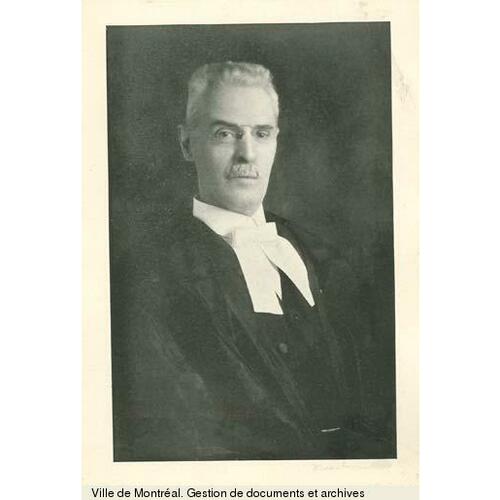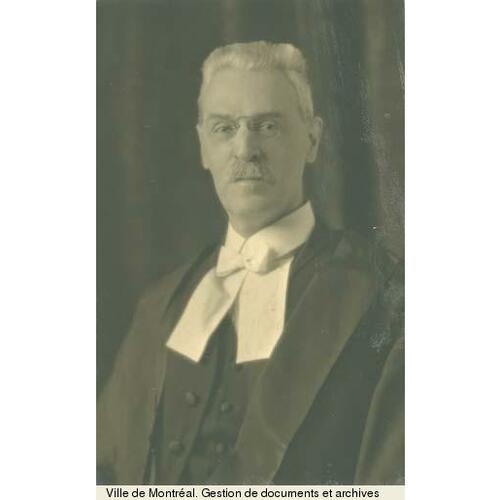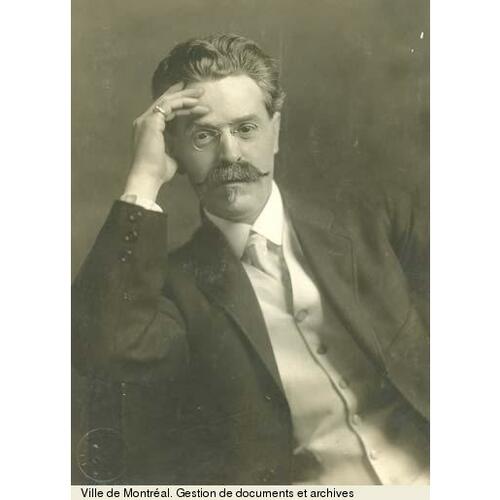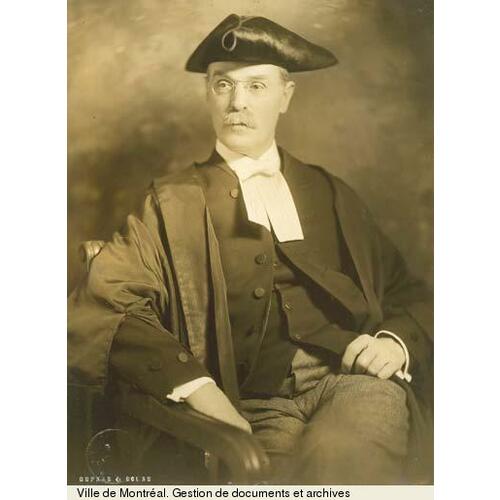DESAULNIERS, GONZALVE (baptized Jean-Baptiste-Amédée-Gonzalve), journalist, poet, lawyer, and judge; b. 24 June 1863 in Upton-Partie-Nord-Est (Saint‑Guillaume), Lower Canada, son of Antoine Lesieur-Desaulniers, a physician, and Hélène-Lucil-Virginie Tellier; m. 5 July 1887 Elizabeth Martin in the Montreal parish of Saint‑Jacques, and they had one son and two daughters; d. suddenly 5 April 1934 in Montreal.
Gonzalve Desaulniers studied at the Collège du Sacré-Cœur in Sorel (Sorel-Tracy) until 1877, when he began four years of classical studies at the Collège Sainte‑Marie in Montreal. There he was on the editorial staff of Le Journal d’Arthabaska, a daily newspaper dedicated to promoting Wilfrid Laurier*, the federal Liberal candidate in the riding of Drummond and Arthabaska. Desaulniers had literary talent, and at the age of 18 he wrote a tragedy in verse that he had the writer Louis Fréchette* read. The latter put his library at the disposal of the young scribe. After studying law (but without attending a school), he would be called to the bar on 5 July 1895.
Meanwhile, Desaulniers earned his living mainly from writing and politics. From 1883 to 1889 he was a journalist in Montreal at L’Étendard, an ultramontane periodical run by Senator François-Xavier-Anselme Trudel*. An active member of the Cercle Ville-Marie, Desaulniers was also the editor of the Montreal Revue canadienne in 1883 and 1884 and wrote a column on political life in Canada and abroad. In December 1889 he left L’Étendard and went to work for the Montreal weekly Le National (at first Castor and later Liberal), for which he had editorial responsibility until it ceased publication in 1896. During the provincial election campaign of 1892 he transformed the paper into a militant daily. Honoré Mercier*’s Liberals were defeated, and Desaulniers’s ideas made the party leaders uneasy. He also contributed to an openly anticlerical Montreal periodical, the Canada-Revue of Aristide Filiatreault*, who was the spokesman for the city’s radical Liberals. In 1896, with Jules Helbronner* and Télesphore Saint‑Pierre*, he wrote for the short-lived Montreal daily Le Soir during the federal campaign that resulted in the election of Laurier and the Liberals.
Work would never keep Desaulniers from pursuing his literary activities. He made his initial forays into poetry in the Revue canadienne as well as in Montreal’s Le Monde illustré (1884, 1885) and Quebec City’s Les Nouvelles Soirées canadiennes (1887). In 1886, after Louis Riel* was hanged, he attracted attention by publishing in Montreal a long poem, L’absolution avant la bataille, which highlighted the heroism of the Montreal militiamen sent to the North-West Territories in May 1885. The text appeared first in La Minerve and later in pamphlet form. In 1893 he defended Fréchette during a spectacular dispute with William Chapman*, who accused the laureate of plagiarism. Desaulniers published poems in the Montreal periodicals Le Journal de Françoise, Le Passe-Temps, La Revue populaire, and La Revue moderne. He also contributed to La Revue des deux Frances (Paris and Montreal).
On 29 April 1898 Desaulniers joined the group of young people who had established the École Littéraire de Montréal. Along with his writer friends Alphonse Beauregard, Germain Beaulieu*, Jean Charbonneau, Hector Demers, Georges-Alma Dumont, Albert Ferland*, Lionel Léveillé, and Jules Tremblay, he participated quite actively in meetings and in 1910 he became president (an office he held from 19 Oct. 1910 until 13 Oct. 1911). Two of the group’s publications, an anthology titled Les soirées du château de Ramezay and the magazine Le Terroir, published in Montreal in 1900 and 1909 respectively, contain a dozen of his poems. In 1926, having been excluded from Les soirées de l’École littéraire de Montréal: proses et vers, a collection released in the same city the previous year, and disagreeing with its offensive remarks about the French writer Anatole France, he resigned in sensational fashion.
Desaulniers flaunted his progressive ideas by taking part in various social and cultural activities, despite the occasional conflicts with the religious authorities that resulted. On 20 Jan. 1899 he joined L’Émancipation masonic lodge in Montreal. (The names of some members of this secret society would be made public in 1910.) In 1902 he and Godfroy Langlois*, who was also a freemason, founded the Ligue de l’Enseignement, which openly advocated educational reform at variance with several aspects of the Roman Catholic Church’s position. In the same year, with the lawyer Zénon Fontaine, he founded the Théâtre des Nouveautés in Montreal, which presented French classical and contemporary plays that did not always please the clergy.
In 1909 Desaulniers was elected president of the Montreal committee of the Alliance Française, an office he would hold for the rest of his life. In this capacity, and also as first vice-president of the Fédération de l’Alliance Française aux États-Unis et au Canada from 1910, he would bring in more than 200 speakers, including representatives of republican and liberal France. Inspired by the fraternal ties between France and Canada during World War I, he would pay homage to his intellectual homeland in a long poem titled Pour la France … (Montreal, 1918). In 1910, on behalf of the École Littéraire de Montréal, he supported Victor Morin’s campaign for a public and secular municipal library in that city. Archbishop Paul Bruchési, like all the province’s bishops, took a dim view of the expansion of such a library, where reading material would not be monitored. Bruchési acted ruthlessly in 1913 when Olivar Asselin, then the president of the Société Saint‑Jean-Baptiste de Montréal, invited his friend Desaulniers to recite a few poems at the celebration on 24 June. It is thought that the archbishop may have threatened to deny the society the use of a hall belonging to the Université Laval if Desaulniers took part in the program. The poet ultimately decided to withdraw.
Desaulniers had practised law in Montreal, alone or in partnership, from at least 1897. He was named a kc in 1903. Over the years he specialized in matters related to the press, championing liberal ideas and defending free speech. For example, in 1908 he represented Rodolphe Girard – the author of Marie Calumet, a novel condemned by the archbishop of Montreal when it was published in 1904 – in a libel suit brought against the Quebec City newspaper La Vérité. He won the case on 27 Oct. 1911. On 15 Jan. 1923, at the age of 59, he was appointed judge of the Superior Court for the district of Montreal. He would serve in this capacity until the end of his life. Among the proceedings over which he presided was the 1928 test case on the opening of cinemas on Sunday.
In 1930 Desaulniers published in Montreal a deluxe, large-format volume that he titled Les bois qui chantent. It contains some 50 of his poems composed over the course of more than 40 years. They represent only part of his output, but they are entirely typical. These approximately 2,500 lines of lyrical and contemplative verse, written in elegant alexandrines, were strongly influenced by his reading of French literary masters such as Jean-Jacques Rousseau and Alphonse de Lamartine. They belong to another era, for they are Parnassian in metrical structure and romantic in inspiration. Although the poems struck some as unconventional, the collection was well received by Quebec critics and by the Académie Française and the Alliance Française in Paris, which awarded him its gold medal. Following this international recognition Desaulniers was admitted to the Royal Society of Canada in 1932. The French government made him an officier de l’Instruction publique, as well as a chevalier and then an officer of the Legion of Honour. In 1927 he was given an honorary doctorate by McGill University in recognition of his contribution to French language and culture.
Ranked by literary historians somewhere between the grandiloquent Louis Fréchette and the intimist Nérée Beauchemin, this lyric poet was indisputably a member of the first generation of the École Littéraire de Montréal, a group with an abiding interest in classical prosody. A liberal-minded man of letters and the law, Gonzalve Desaulniers stood out from his peers by winning recognition in forms of expression as disparate as journalism, poetry, lectures, court argument, and judicial decisions.
In addition to works already mentioned, Gonzalve Desaulniers wrote “La chevrette,” RSC, Trans., 2nd ser., 5 (1899), sect.i: 81–86 and Sir Lomer Gouin: sa vie, son œuvre ([Montréal], 1923).
BANQ-CAM, CE601-S33, 5 juill. 1887; CE601-S51, 9 janv. 1854. BANQ‑MCQ, CE403-S11, 24 juin 1863. Centre de Recherche Interuniversitaire sur la Littérature et la Culture Québécoises, Univ. Laval (Québec), Arch. du projet DOLQ; Arch. du projet Histoire de la vie littéraire au Québec. Le Canada (Montréal), 6 avril 1934. Le Devoir, 9 avril 1934. Le Pays (Montréal), 8 juin, 9 août 1913. La Presse, 13 juill. 1903, 14 oct. 1911. Le Réveil (Montréal), 9 févr. 1895, 7 janv. 1899. [É.‑J. Auclair], “L’honorable juge Desaulniers,” RSC, Trans., 3rd ser., 28 (1934), proc.: x–xii. Samuel Baillargeon, Littérature canadienne-française (Montréal, 1957). Germain Beaulieu, Nos immortels (Montréal, 1931), 59–69. Henri Bernard, La Ligue de l’enseignement: histoire d’une conspiration maçonnique à Montréal (Notre-Dame-des-Neiges [Montréal], 1904), 27–28. Jean Charbonneau, L’École littéraire de Montréal: ses origines, ses animateurs, ses influences (Montréal, 1935), 161–72. Dictionary of literary biography (357v. to date, Detroit, 1978– ), 92 (Canadian writers, 1890-1920, ed. W. H. New, 1990): 82–85. DOLQ, 2: 151–53. L’École littéraire de Montréal: procès-verbaux et correspondance (et autres documents inédits sur l’école), Réginald Hamel, édit. (2v., Montréal, 1974). Guy Frégault, Histoire de la littérature canadienne-française: seconde moitié du XIXe siècle (Montréal, 1996), 108–24. Antonio Huot, Le poison maçonnique (Québec, 1911), 23–25. A.‑J. Lemieux, La loge L’Émancipation (Montréal, 1910), 21–30. Roger Le Moine, Deux loges montréalaises du Grand Orient de France (Ottawa, 1991), 85–87, 111–12. P.‑G. Roy, Les juges de la prov. de Québec. La vie culturelle à Montréal vers 1900, sous la dir. de Micheline Cambron ([Montréal], 2005). Paul Villard, Alliance française, comité de Montréal, 1902-1942: quarante années au service de la pensée française (Montréal, 1941).
Cite This Article
Kenneth Landry, “DESAULNIERS, GONZALVE (baptized Jean-Baptiste-Amédée-Gonzalve),” in Dictionary of Canadian Biography, vol. 16, University of Toronto/Université Laval, 2003–, accessed December 31, 2025, https://www.biographi.ca/en/bio/desaulniers_gonzalve_16E.html.
The citation above shows the format for footnotes and endnotes according to the Chicago manual of style (16th edition). Information to be used in other citation formats:
| Permalink: | https://www.biographi.ca/en/bio/desaulniers_gonzalve_16E.html |
| Author of Article: | Kenneth Landry |
| Title of Article: | DESAULNIERS, GONZALVE (baptized Jean-Baptiste-Amédée-Gonzalve) |
| Publication Name: | Dictionary of Canadian Biography, vol. 16 |
| Publisher: | University of Toronto/Université Laval |
| Year of publication: | 2015 |
| Year of revision: | 2015 |
| Access Date: | December 31, 2025 |


![M. Gonzalve Desaulniers [image fixe] Original title: M. Gonzalve Desaulniers [image fixe]](/bioimages/w600.3241.jpg)





